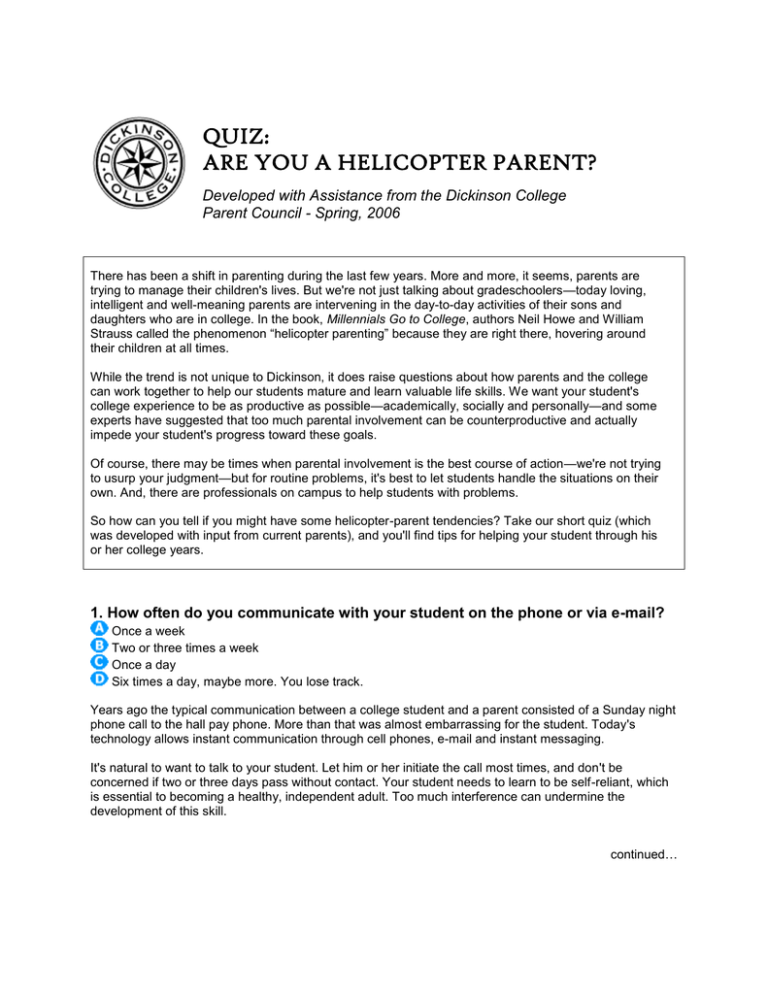QUIZ: ARE YOU A HELICOPTER PARENT?
advertisement

QUIZ: ARE YOU A HELICOPTER PARENT? Developed with Assistance from the Dickinson College Parent Council - Spring, 2006 There has been a shift in parenting during the last few years. More and more, it seems, parents are trying to manage their children's lives. But we're not just talking about gradeschoolers—today loving, intelligent and well-meaning parents are intervening in the day-to-day activities of their sons and daughters who are in college. In the book, Millennials Go to College, authors Neil Howe and William Strauss called the phenomenon “helicopter parenting” because they are right there, hovering around their children at all times. While the trend is not unique to Dickinson, it does raise questions about how parents and the college can work together to help our students mature and learn valuable life skills. We want your student's college experience to be as productive as possible—academically, socially and personally—and some experts have suggested that too much parental involvement can be counterproductive and actually impede your student's progress toward these goals. Of course, there may be times when parental involvement is the best course of action—we're not trying to usurp your judgment—but for routine problems, it's best to let students handle the situations on their own. And, there are professionals on campus to help students with problems. So how can you tell if you might have some helicopter-parent tendencies? Take our short quiz (which was developed with input from current parents), and you'll find tips for helping your student through his or her college years. 1. How often do you communicate with your student on the phone or via e-mail? Once a week Two or three times a week Once a day Six times a day, maybe more. You lose track. Years ago the typical communication between a college student and a parent consisted of a Sunday night phone call to the hall pay phone. More than that was almost embarrassing for the student. Today's technology allows instant communication through cell phones, e-mail and instant messaging. It's natural to want to talk to your student. Let him or her initiate the call most times, and don't be concerned if two or three days pass without contact. Your student needs to learn to be self-reliant, which is essential to becoming a healthy, independent adult. Too much interference can undermine the development of this skill. continued… 2. How many professors have you contacted on your student's behalf? None One or two You're not sure, maybe five All of them We understand the impulse. If your student is upset, you want to fix it. But it's not appropriate for a parent to intervene about the syllabus, the amount of homework or to challenge a grade. The student should speak directly to his or her professor about concerns. All professors have office hours for that purpose. College is a good opportunity for students to learn to make decisions for themselves (whether good or bad) and then learn how to manage the consequences. Stepping in often doesn't allow that to happen. 3. How much input do you have in your student's course selections? You're available to talk about it. You have a standing appointment before each semester to discuss his or her options. Your student must get your approval before registration day. You study the course selections on the Web site and completely arrange your student's schedule. Dickinson has advisers and class deans to assist your student with this process. They are well versed on the college's general requirements and those for each major and how your student can best fulfill them. 4. Your student feels he or she isn't getting enough playing time on an athletic team. What do you do? Pat your student on the back for hanging in there, attend games if you can, and cheer like crazy. Tell your student to talk to the coach about his or her concerns. You e-mail the coach. You call the college president and remind him who's paying the bill. Problems arise. The best results come from your student's initiative in solving them. The time to end parental “sideline coaching” has arrived. 5. Your student is having trouble writing a paper. What do you do? You listen. You're sympathetic. Suggest your student make appointments with the professor and the Writing Center. Read what's been written so far and give suggestions. Get a copy of the assignment and write the whole thing. (After all, your student is really busy.) Assignments and papers are opportunities for students to learn. All work must be in the student's own words—there is no leeway on this. Conversations with your student about academic progress are good. But sometimes, unfortunately, a student has to falter in order to learn. ARE YOU A HELICOPTER PARENT? 6. When visiting your student, how much do you help? You don't clean his or her room. It's not your job. You help to take out the trash. After taking out the trash, you do the laundry. You provide maid services and leave mints on the pillow. Maybe your GPS is programmed to take you straight to your student's residence hall or apartment, but he or she has to learn to function as an adult. Although your student may have grown accustomed to your help, it's time to stop. 7. Your student hates his or her roommate. What do you do? Remind your student of other times he or she has successfully solved problems. Tell your student to talk to the RA. Storm the Office of Residence Life. You want to know what on earth is being done about this. Call the roommate's parents and let them have it. Learning to interact with people of various backgrounds is a skill that is needed daily in adult life. Encourage your student to be accepting of different personalities and address the issues directly with the roommate. If problems persist, the RA has been trained to help resolve conflicts. 8. Your student has just been found responsible for a minor conduct violation. What do you do? You take headache medication and discuss with your student the consequences of inappropriate behavior. Show up on your student's doorstep. Call the college president. You pay a lot of tuition—your kid should be let off the hook. Call Alan Dershowitz and print up “Free Jenny” T-shirts. Students are made fully aware of the consequences of conduct violations. We expect our students to behave responsibly—it's part of being an adult. Note that most violations result in minor repercussions. ARE YOU A HELICOPTER PARENT? SCORE Number of Number of Number of Number of Answers: ________________ Answers: ________________ Answers: ________________ Answers: ________________ Your answers are your grades: All A's: – You're on the Distinguished Honor Roll. Great job! Mostly A's – You're on the Honor Roll. Keep up the good work. Mostly B's – You're doing well. Mostly C's – It may be time to rethink your college habits. Re-read the tips after each question, and maybe you'll reach the Honor Roll next semester. Mostly D's – We know you mean well, but you've just learned that hovering can be detrimental to your student. Take a deep breath, and check out the books listed below. CONCLUSION We're not saying you should never contact the school, but it's important for your student to form a sense of identity, resiliency and responsibility. We know it's hard to watch your student be uncomfortable or even to fail, but being overly involved doesn't allow your student to learn from disappointment. If your student has attempted to resolve an issue and has been unsuccessful, you may contact the appropriate department for suggestions about what your student should do next. Dickinson's Parents Guide has a section called “Time of transition for parents, too.” It offers good advice to frequently asked questions. If you don't have a printed copy of the book, go to: http://www.dickinson.edu/parent/guide/ For more on the subject: Letting Go – A Parents' Guide to Understanding the College Years, Karen Levin Coburn and Madge Lawrence Treeger Don't Tell Me What to Do, Just Send Money –The Essential Parenting Guide to the College Years, Helen E. Johnson & Christine Schelhas-Miller You're on Your Own (But I'm here if you need me): Mentoring Your Child During the College Years, Simon and Shuster Fireside edition, 2003 by Marjorie Savage Robert J. Massa Vice President for Enrollment & College Relations Dickinson College Carlisle, PA 17013 (717) 245-1287 ARE YOU A HELICOPTER PARENT?
